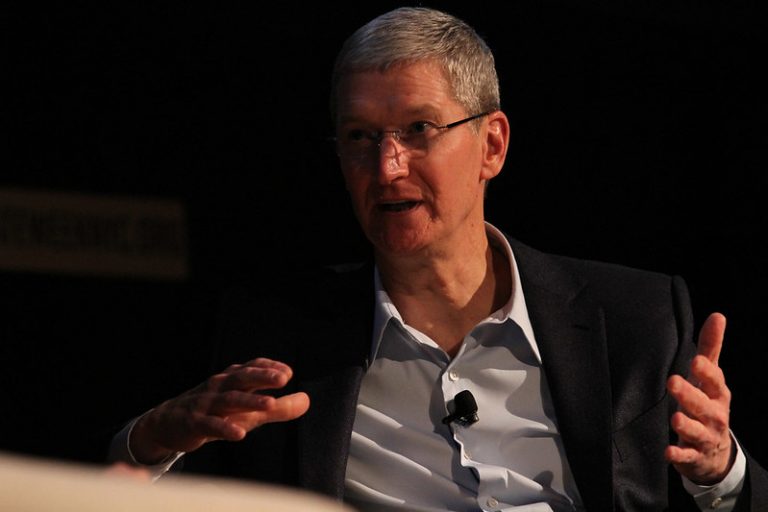 APPS
APPS
 APPS
APPS
 APPS
APPS
Apple Inc. returned to form as it delivered its fiscal second-quarter earnings report today, beating Wall Street’s expectations thanks to stronger than expected iPhone sales.
The company couldn’t prevent its overall sales declining for the second quarter in a row, though, and its finance chief Luca Maestri warned investors that revenue will likely decline in the current quarter too. Still, investors liked what they saw, as Apple’s stock gained more than 2% in the extended trading session.
Apple reported a net income of $24.16 billion for the quarter, down slightly from the $25.01 billion profit it delivered one year earlier. Earnings before certain costs such as stock compensation came to $1.52 per share, above the analyst’s consensus estimate of $1.43. Apple also reported revenue of $94.84 billion, down 3% from the same period last year but above the forecast of $92.96 billion.
In a statement, Apple Chief Executive Tim Cook (pictured) hailed his team for delivering record March-quarter revenue for the iPhone, despite the challenging macroeconomic environment it faces. He also revealed that Apple’s installed base of active devices reached a new record high. “We continue to invest for the long term and lead with our values, including making major progress toward building carbon neutral products and supply chains by 2030,” Cook said.
Once again, Apple refused to provide formal guidance for the coming quarter, as it has done ever since the coronavirus pandemic emerged back in early 2020. However, Maestri offered some data points on a conference call with analysts, and said revenue will likely decline, again by about 3%. “We expect our June quarter year-over-year revenue performance to be similar to the March quarter assuming that the macroeconomic outlook does not worsen from what we are projecting today for the current quarter,” the CFO said.
As always, the star performer for Apple was its iPhone business, where revenue increased from one year earlier even as the broader smartphone industry declined 15% during that time, according to estimates from International Data Corp. Apple said iPhone revenue came to $51.33 billion during the quarter, well above the $48.84 billion forecast by analysts. The results suggest some of the production issues that caused Apple to miss earnings and revenue expectations in the previous quarter have abated somewhat.
Apple’s business isn’t without problems, though. Revenue from its Mac and iPad segments both fell short of expectations. Mac sales fell more than 31%, to just $7.17 billion, far below the $7.8 billion expected by analysts. Meanwhile, iPad sales fell 13%, to $6.67 billion, just below the $6.69 billion expected.
Revenue from the Services business, which includes monthly subscriptions, sales from the App Store, warranties and search-licensing revenue, rose 5.5% from a year earlier, to $20.91 billion, just below Wall Street’s target of $20.97 billion.
Finally, Apple’s wearables division, including products such as Apple Watch and AirPods headphones, fell 1% from a year ago, to $8.76 billion, but came in above the forecast of $8.43 billion.
Revenue from Apple’s regional business in mainland China, Taiwan and Hong Kong also declined from $18.43 billion one year ago to $17.81 billion today. Analysts had been hopeful of renewed growth in China as that country finally puts the coronavirus-era lockdowns and restrictions behind it.
The results show that Apple’s product and service portfolio are not recession-proof, Holger Mueller of Constellation Research Inc. told SiliconANGLE.
“Apple kept its sales and general and administrative costs constant year-over-year, but its R&D costs were up by $1 billion and the result is that its operating income is down by more than half,” Mueller pointed out. “Apart from services, iPhone was the only business category that was able to grow. More than ever before, Apple is now the ‘iPhone company’ and that means the pressure to keep on growing will increase.”
In an interview with CNBC, Cook said he’s very optimistic about the company’s prospects in India, now the world’s most populous nation. Cook visited India last month to open the first official Apple stores and meet with its leaders.
“The switcher and first-time buyer metrics look very good there for India,” Cook told CNBC. The term “switcher” refers to first-time buyers of iPhones, who switch from Android devices.
In the interview, Cook also insisted that Apple will do everything possible to avoid making mass layoffs like so many of its peers in the technology industry. While not completely ruling it out, the CEO said no layoffs are currently planned and that it would only do so “as a last resort.”
Cook did admit that Apple is cutting costs and has scaled back on new hires, however. “We’re continuing to be extremely prudent on hiring,” he said. “We’re continuing to hire, just at a lower clip level than we were before.”
Support our mission to keep content open and free by engaging with theCUBE community. Join theCUBE’s Alumni Trust Network, where technology leaders connect, share intelligence and create opportunities.
Founded by tech visionaries John Furrier and Dave Vellante, SiliconANGLE Media has built a dynamic ecosystem of industry-leading digital media brands that reach 15+ million elite tech professionals. Our new proprietary theCUBE AI Video Cloud is breaking ground in audience interaction, leveraging theCUBEai.com neural network to help technology companies make data-driven decisions and stay at the forefront of industry conversations.